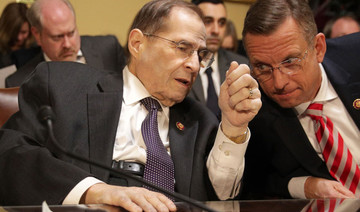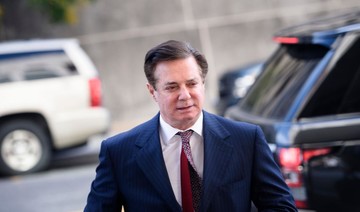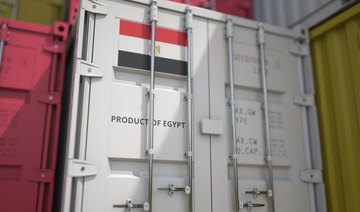WASHINGTON: President Donald Trump can’t get enough of Rep. Ilhan Omar.
As Democratic lawmakers try to turn the page after the liberal legislator’s use of anti-Semitic tropes ignited an embarrassing, intra-party fight, the Republican president is trying to prolong and weaponize the issue for his 2020 campaign, asserting during a private weekend fundraiser that Democrats “hate” Jews.
While Trump publicly muses about winning over Jewish voters for his re-election, his motivations are more complicated and expansive. The president’s rhetorical escalation also is designed to unsettle the Democratic primary debate, exploit an issue that can energize his supporters and move past his own history of toying in anti-Semitic motifs.
Trump on Tuesday promoted comments by former model and 2016 campaign staffer Elizabeth Pipko, who said on Fox & Friends that “Jewish people are leaving the Democratic Party.”
Pipko, who serves as spokesperson for the group “Jexodus,” which bills itself as speaking for “Jewish Millennials tired of living in bondage to leftist politics,” saw her comments amplified by Trump on Twitter. “There is anti-Semitism in the Democratic Party,” she continued. “They don’t care about Israel or the Jewish people.”
Her comments mirrored Trump’s charge on Friday that Democrats had become an “anti-Israel” and “anti-Jewish” party, responding to the House voted a day before to disapprove of all prejudice in response to Omar’s invocation of “dual-loyalty” charges against American supporters of Israel earlier this month.
Speaking later that evening, Trump went even further in an appearance before Republican National Committee donors, charging that Democrats “hate” Jewish people, according to a person who heard the remarks but spoke on condition of anonymity to describe the president’s comments at a private event.
Omar had sparked a political firestorm that derailed the Democrats’ focus on investigations of the Trump administration, including a public back-and-forth over how, or even if, her party should condemn her comments. The ultimate resolution, which passed the House overwhelmingly, didn’t call out Omar by name.
As a small percentage of the nation, American Jews are not a particularly significant voting bloc, nor is Israel their decisive issue of concern. And both parties acknowledge the controversy is unlikely to alter dramatically the electoral votes of the American Jewish community, which has skewed decisively toward Democrats for more than a generation.
Even a small shift, though, can be significant.
“We’re slicing the salami very thin, and an incremental shift in traditional Democratic blocs to the other side can have a profound impact,” said Matt Brooks, executive director of the Republican Jewish Coalition. He said his group plans to make “the largest investment that we’ve ever had in the 2020 race in terms of outreach, advocacy and independent expenditures on behalf of the president.”
Stoking the fight also gives Trump an opportunity to deflect criticism of his own rhetoric, invigorate evangelical Christians for whom the Israel issue is a powerful motivator and paint Democrats into a radical corner.
It also plays into Trump’s attempt to cast Democrats as radicals ahead of the 2020 campaign, said conservative commentator Seth Mandel, executive editor of the Washington Examiner magazine. He noted that Democratic Rep. Alexandria Ocasio-Cortez and Sen. Bernie Sanders pushed back against efforts to condemn Omar’s comments. “It makes it very easy to say they’re just adopting whatever the socialist says.”
White House press secretary Sarah Sanders kept the controversy alive on Monday by criticizing Democrats for failing to explicitly repudiate Omar.
“It’s something that should be called by name,” she said. “It shouldn’t be put in a watered-down resolution.”
Sanders pointed to Republican condemnation of Rep. Steve King earlier this year, including stripping the Iowa Republican of his committee memberships, after he made remarks defending white supremacy. But King had long espoused racially charged ideas, and the GOP only took action after it lost its majority in the chamber.
Minnesota Sen. Amy Klobuchar, who is running for the Democratic presidential nomination, warned that Trump’s politicization of the issue “threatens the bipartisan support for Israel.”
“The problem is that the president sees it somehow as a way to make some kind of political hay and a wedge,” she said. “And he keeps addressing it that way. And I just think it’s a mistake, as someone that’s a strong supporter of Israel, that he keeps doing it.”
Hallie Soifer, the executive director of the Jewish Democratic Council of America, said her group welcomes Trump’s focus on the issue of anti-Semitism. “He himself has emboldened anti-Semites in our country by both repeating anti-Semitic tropes and conspiracy theories,” she said. “He has no credibility with Jewish voters.”
Trump has been among the loudest critics of Omar, including last month when he called on her to resign from the House, or at least resign her post on the Foreign Affairs Committee over her suggestion that Jewish money drove support for Israel.
But Trump himself has repeatedly deployed some of the same tropes that sent fire toward Omar. He was slow to condemn white supremacists who marched violently in Charlottesville, Virginia, in 2017. In 2016 he circulated an image of a six-pointed star alongside a photo of Hillary Clinton, a pile of money and the words “most corrupt candidate ever.” And he told a group of Republican Jewish donors he didn’t expect to earn their support because he wouldn’t take their money.
“You want to control your politicians, that’s fine,” he told the Republican Jewish Coalition in 2015. Ultimately, the group and many of its donors backed Trump. Brooks said Trump’s comments were meant obviously in jest and any suggestion otherwise is “unfair and ridiculous.”
“Jexodus” is hardly the first time Trump has tried to peel away minority voters from the Democratic coalition. He has pushed the “WalkAway” and “Blexit” movements to win over black voters to the GOP, but those efforts proved to have limited, if any impact.
According to AP Votecast, a survey of more than 115,000 midterm voters and 3,500 Jewish voters nationwide, voters who identified as Jewish broke for Democrats over Republicans by a wide margin, 72 percent to 26 percent, in 2016.
Over the last decade, Jewish voters have shown stability in their partisanship, according to data from Pew Research Center. Jewish voters identify with or lean toward the Democratic Party over the Republican Party by a roughly 2-to-1 margin.
Trump sees advantage in debate over Israel, anti-Semitism
Trump sees advantage in debate over Israel, anti-Semitism
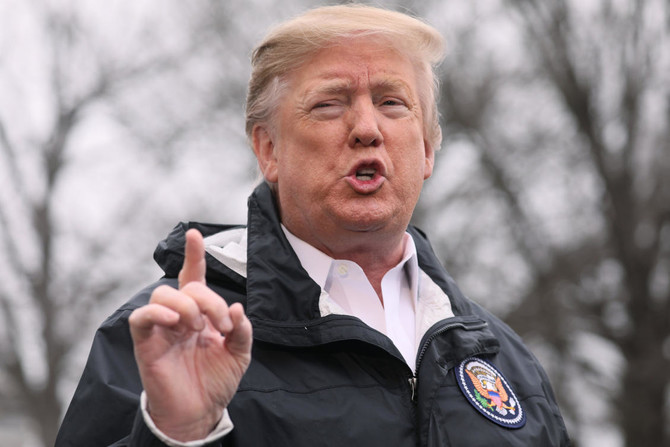
- While Trump publicly muses about winning over Jewish voters for his re-election, his motivations are more complicated and expansive
- Trump went even further in an appearance before Republican National Committee donors, charging that Democrats “hate” Jewish people
Opposition leaders in Kashmir accuse Indian government of sabotaging their campaigns
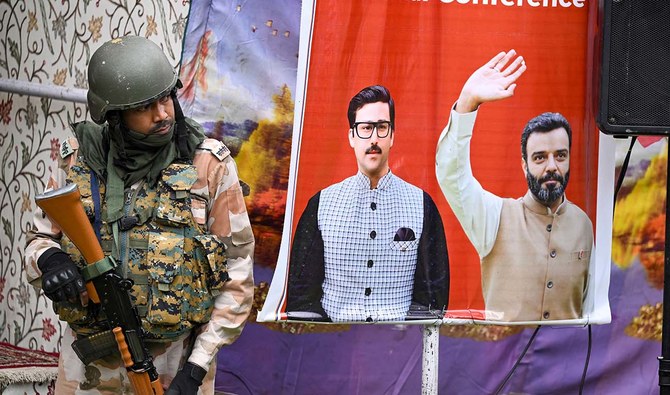
- Omar Abdullah says police canceled permissions for his rallies, asking him to reschedule without giving reasons
- Mehbooba Mufti of People’s Democratic Party also accused the police of not allowing her to hold campaign events
NEW DELHI: Opposition leaders in India’s troubled Kashmir valley have accused Prime Minister Narendra Modi’s administration of denying or canceling permissions to hold campaign events, to help his party’s “proxies.”
Omar Abdullah, a leader of the largest regional political party, the National Conference, said Modi’s government was trying to sabotage his campaign ahead of voting in the first of Kashmir’s three seats on Monday.
Modi’s Bharatiya Janata Party (BJP) is skipping elections in Kashmir for the first since 1996, which analysts and politicians in the region say belies his narrative of integrating Kashmir with the rest of the country and bringing peace and normality to the valley ravaged by a 35-year-old uprising against India’s rule.
In 2019, Modi revoked Jammu and Kashmir state’s partial autonomy, removed its statehood and divided it into two federally-controlled territories: Muslim-majority Kashmir with Hindu-dominated Jammu, and a mountainous Buddhist territory of Ladakh.
While the BJP has not fielded any candidate in Kashmir’s three seats, it has said that, as part of its grand strategy, it would instead support other smaller regional parties, without naming which.
In a letter to the federal poll watchdog, the Election Commission of India, on Thursday, Abdullah said the police, which are under the federal government’s control, canceled permissions for his rallies, asking him to reschedule without providing any reasons.
He said on social media platform X that it was done to help the BJP’s “proxy candidates.”
His rival Mehbooba Mufti, who heads the other regional political powerhouse the People’s Democratic Party (PDP), also accused the police of not allowing her to hold campaign events.
“This attitude of the police, in which they curtail our movement to support the proxy parties of the BJP, is against the guidelines of the Election Commission of India,” she said at a rally in Srinagar on Thursday.
V.K. Birdi, the police official responsible for Kashmir, did not immediately respond to a request seeking comment.
Both Abdullah and Mufti have said they were opposed to the BJP and would support an opposition Congress-led alliance of more than two dozen parties federally.
The state unit of the election watchdog has also asked PDP’s Srinagar candidate, Waheed ur Rehman Para to refrain from calling this election a “referendum” against scrapping of semi-autonomy of the region in 2019 in his speeches.
While Srinagar will vote on May 13, the elections in the other two seats will be held on May 20 and 25.
Nuclear-armed neighbors India and Pakistan control parts of Kashmir, but claim it in full, and have fought two of their three wars over the region.
India top court grants temporary bail to opposition leader Kejriwal to campaign in elections
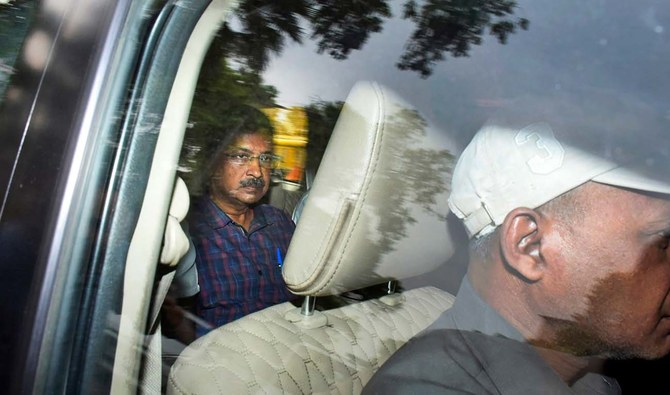
- Bail would last until June 1, last day of seven-phase vote, and Kejriwal would have to surrender on June 2
- Poll marred by charges that PM Narendra Modi’s government is using investigating agencies to hurt rivals
NEW DELHI: India’s top court gave temporary bail to Delhi Chief Minister Arvind Kejriwal in a graft case on Friday, allowing him to campaign in the ongoing general elections, boosting the opposition alliance of which he is a key leader.
The court said the temporary bail would last until June 1, the last day of the seven-phase vote, and Kejriwal would have to surrender on June 2.
The poll has been marred by charges that Prime Minister Narendra Modi’s government is using investigating agencies to hurt rivals, accusations the government denies.
The Enforcement Directorate, India’s financial crime-fighting agency, arrested Kejriwal — a staunch critic of Modi and a key opposition leader — on March 21 in connection with corruption allegations related to the capital territory’s liquor policy.
Kejriwal’s government and his Aam Aadmi Party have denied the corruption allegations. Modi and his Bharatiya Janata Party say that the investigating agencies are only doing their job and the government is not influencing them.
Kejriwal has been in pre-trial detention since April 1, and his wife Sunita has stepped in to campaign for his decade-old party in his absence.
India began voting on April 19 and elections to more than half the total 543 seats were completed with the third phase on May 7. The national capital territory will vote on May 25.
Voting concludes on June 1 and counting is set for June 4.
The Supreme Court, while hearing an appeal against Kejriwal’s arrest last week, said that it “may” consider granting “interim bail” or temporary bail to the high-profile leader “because of the elections” as the appeal against his arrest could take a while to conclude.
Kejriwal argued that he was arrested just before the vote to stop him from campaigning against Modi, who opinion polls suggest will win a comfortable majority and secure a rare third straight term.
His lawyer said Kejriwal is a serving chief minister, not a “habitual offender.”
ED lawyers argued that giving bail to a politician just to campaign will send a wrong message that there are different standards for them and other citizens. Kejriwal had to be arrested as he refused nine ED summons over six months to appear for questioning, they added.
The INDIA alliance of more than two dozen opposition parties has called the action against Kejriwal and other opposition leaders politically motivated to deny them a level playing field in the polls, accusations Modi and BJP reject.
Kejriwal’s arrest had drawn international attention, with Germany and the United States calling for a “fair” and “impartial” trial.
Philippines invites Saudi partnerships in halal industry, renewables
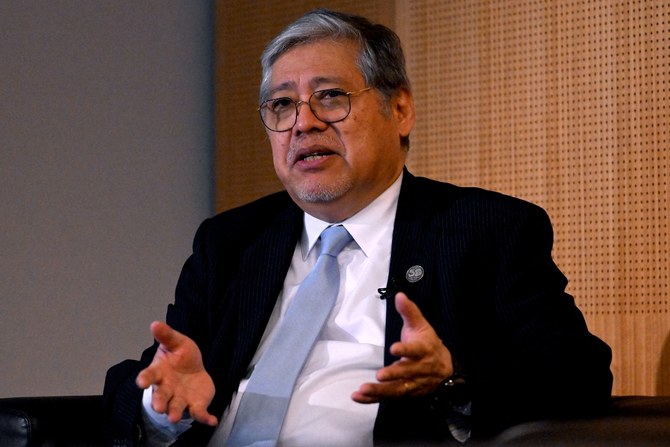
- Govt wants renewables to contribute 35% to energy mix by 2030
- It launched strategic plan to develop domestic halal industry in January
MANILA: The Philippines says it is open to expanding partnerships with Saudi Arabia in its top priority sectors, including renewable energy and the halal industry.
The use of renewable energy was announced as the main issue in the country’s climate agenda during President Ferdinand Marcos Jr.’s first state of the nation address in 2022.
Renewable energy contributes about 30 percent to the Philippines’ energy mix, which is dominated by coal and oil. The government seeks to increase it to 35 percent by 2030 and 50 percent by 2040, and make renewables more accessible to the public.
“Given the Kingdom’s role in the supply of conventional and renewable energy, the Philippines is open to possible partnerships in the field of renewables,” Foreign Affairs Secretary Enrique Manalo told Arab News this week.
An agreement to enhance cooperation in the field was reached in October, during President Ferdinand Marcos’ visit to the Kingdom at the invitation of Saudi Crown Mohammed bin Salman.
A business delegation accompanying the president signed investment agreements collectively worth more than $4.26 billion with Saudi business leaders.
“With Saudi Arabia’s role as a regional business and political hub, we wish to increase investments,” Manalo said.
“Further, amidst the region’s changing landscape and economic diversification initiatives, we aspire to expand our partnership in the fields of agriculture, tourism and the halal industry.”
In January, the predominantly Catholic Philippines — where Muslims constitute about 10 percent of the almost 120 million population — launched its Halal Industry Development Strategic Plan to tap into the global halal market, which is estimated to be worth more than $7 trillion.
The plan aims to double the industry’s output in the next four years, create 120,000 new jobs and attract $4 billion in investments by 2028.
Greece to bring in Egyptian farm workers amid labor shortage

- Greece will take in around 5,000 seasonal farm workers under the 2022 deal signed with Egypt
ATHENS: Greece will start bringing in workers from Egypt this summer to take on temporary farming jobs under a deal between the countries to tackle a labor shortage, the migration ministry said on Friday.
After a decade of pain, the Greek economy is forecast to grow nearly 3 percent this year, far outpacing the euro zone average of 0.8 percent.
But an exodus of workers during Greece’s economic crisis, a shrinking population and strict migration rules have left the country struggling to find tens of thousands of workers to fill vacancies in farming, tourism, construction and other sectors.
Greece will take in around 5,000 seasonal farm workers under the 2022 deal signed with Egypt.
The countries have discussed expanding the “mutually beneficial” scheme to the Greek construction and tourism sectors, the Greek Migration Ministry said in a statement.
Migration has long been a divisive issue in Europe, but the plan had won broad support from employers groups keen to find workers.
Greek Migration Minister Dimitris Kairidis met Egyptian Labour Minister Hassan Shehata in Cairo this week and said the countries should also step up cooperation to fend off illegal migration flows in the region.
Egyptian officials have said their country deserves recognition for largely stopping migrants setting off from its northern coast across the Mediterranean to Europe since 2016.
The European Union this year announced a multi-billion euro funding package and an upgraded relationship with Egypt, part of a push to cut down on the number of migrants crossing over from North Africa.
Rights groups have criticized Western support for Egyptian President Abdel Fattah El-Sisi, who came to power a decade ago after leading the overthrow of Egypt’s first democratically elected leader.
India says Canada has shared no evidence of its involvement in killing of Sikh separatist leader
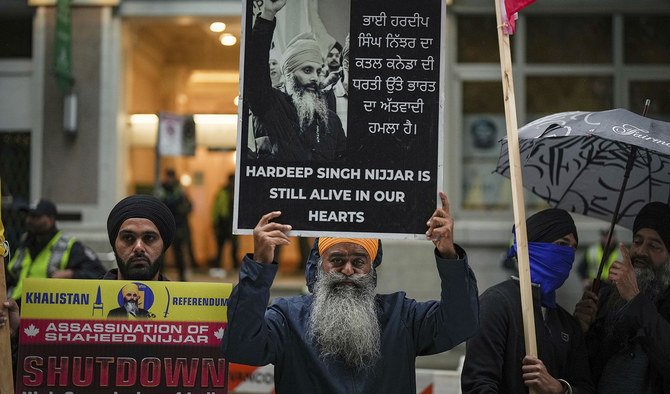
- Three Indian nationals who had been temporarily living in Canada were arrested on Tuesday in the June slaying of Hardeep Singh Nijjar
- PM Trudeau set off a diplomatic spat with India in Sept. when he cited ‘credible allegations’ of India’s involvement in the Sikh’s murder
NEW DELHI: India said Thursday that Canada has shared no evidence to back its allegation that the Indian government was involved in the slaying of a Sikh separatist leader in Canada last year, despite the recent arrests of three Indian men in the crime.
India’s External Affairs Ministry spokesman Randhir Jaiswal also reiterated India’s longstanding allegation that Canada harbors Indian extremists.
Three Indian nationals who had been living in Canada temporarily were arrested on Tuesday in the slaying last June of Hardeep Singh Nijjar in British Columbia. Canadian Prime Minister Justin Trudeau had set off a diplomatic spat with India last September when he cited “credible allegations” of India’s involvement in the slaying of the Sikh separatist. India rejected the accusations.
Canadian Mounted Police Superintendent Mandeep Mooker said after the men’s arrests that the investigation into whether they had ties to India’s government was ongoing.
Jaiswal said the two governments are discussing the case but that Canada has forwarded no specific evidence of the Indian government’s involvement.
Meanwhile, Jaiswal said New Delhi has complained to Canadian authorities that separatists, extremists and those advocating violence against India have been allowed entry and residency in Canada. “Many of our extradition requests are pending,” he said.
“Our diplomats have been threatened with impunity and obstructed in their performance of duties,” Jaiswal added. “We are having discussions at the diplomatic level on all these matters,” he said.
The three Indian men arrested in Canada haven’t yet sought any access to the Indian diplomats there, Jaiswal said.
The three — Kamalpreet Singh, 22, Karan Brar, 22, and Karanpreet Singh, 28 — appeared in court Tuesday via a video link and agreed to a trial in English. They were ordered to appear in British Columbia Provincial Court again on May 21.
They were arrested last week in Edmonton, Alberta. They have been charged with first-degree murder and conspiracy to commit murder.


